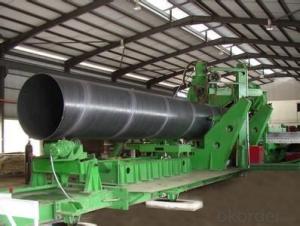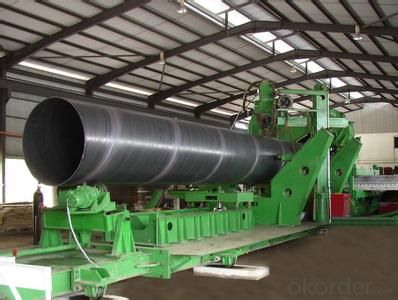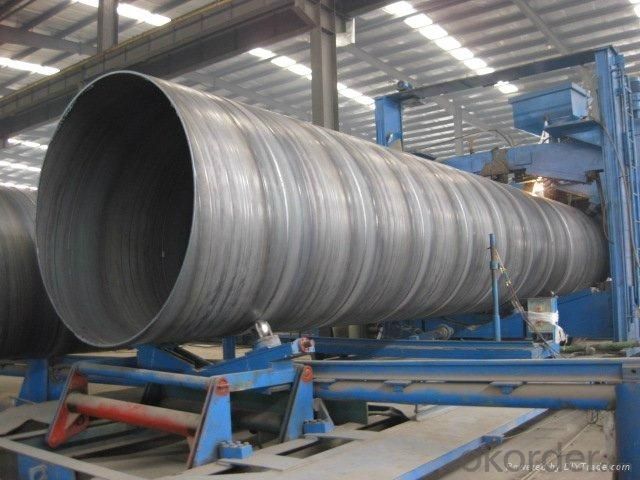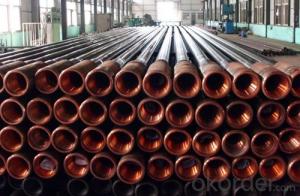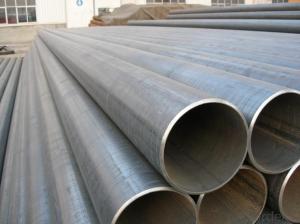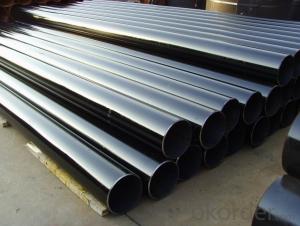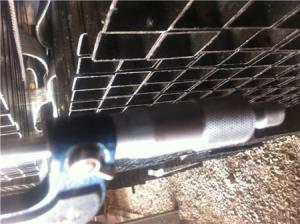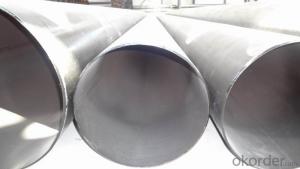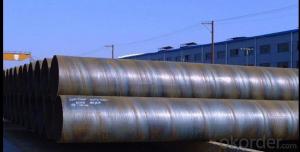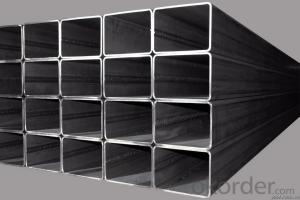API 5L GR.B SSAW Steel Pipe With Good Quality
- Loading Port:
- Tianjin
- Payment Terms:
- TT or LC
- Min Order Qty:
- 25 m.t.
- Supply Capability:
- 10000 m.t./month
OKorder Service Pledge
OKorder Financial Service
You Might Also Like
1、Structure of API 5L GR.B SSAW Steel Pipe:
This is Spirally Submerged Arc Welded Steel Pipe.
2、Main Features of the API 5L GR.B SSAW Steel Pipe:
• High manufacturing accuracy
• High strength
• Small inertia resistance
• Strong heat dissipation ability
• Good visual effect
• Reasonable price
3、 API 5L GR.B SSAW Steel Pipe Specification:
Standard | GB, DIN, ASTM ASTM A106-2006, ASTM A53-2007 |
Grade | 10#-45#, 16Mn 10#, 20#, 45#, 16Mn |
Thickness | 8 - 33 mm |
Section Shape | Round |
Outer Diameter | 133 - 219 mm |
Place of Origin | Shandong, China (Mainland) |
Secondary Or Not | Non-secondary |
Application | Hydraulic Pipe |
Technique | Cold Drawn |
Certification | API |
Surface Treatment | factory state or painted black |
Special Pipe | API Pipe |
Alloy Or Not | Non-alloy |
Length | 5-12M |
Outer Diameter | 21.3-610mm |
Grade | 20#, 45#, Q345, API J55, API K55, API L80, API N80, API P110, A53B |
Standard | ASME, ASTM |
1) Material:20#(ASTM A 106/A53 GRB.API5LGRB,GB),45#,16Mn,10#.
2) Specification range:OD:21.3-610mm,WT:6-70mm,length:6-12m or according to the requirement of clients.
3) Excutive standards:GB,ASME API5L.ASTM A 106/A53,Despite of the above standards,we can also supply seamless steel pipe with standard of DIN,JIS,and so on,and also develop new products according to the requirements of our clients!
4) Surface:black lacquered,varnish coating or galvanized.
5) Ends:Beveled or square cut,plastic capped,painted.
6) Packing:bundles wrapped with strong steel strip,seaworthy packing.
4、Packaging & Delivery
Packaging Details: | seaworthy package,bundles wrapped with strong steel strip |
Delivery Detail: | 15-30days after received 30%TT |
5、FAQ of API 5L GR.B SSAW Steel Pipe :
①How is the quality of your products?
Our products are manufactured strictly according to national and internaional standard, and we take a test
on every pipe before delivered out. If you want see our quality certifications and all kinds of testing report, please feel free to contact us.
Guaranteed: If products’ quality don’t accord to discription as we give or the promise before you place order, we promise 100% refund.
②How about price?
Yes, we are factory and be able to give you lowest price below market one, and we have a policy that “ for saving time and absolutely honest business attitude, we quote as lowest as possible for any customer, and discount can be given according to quantity”,if you like bargain and factory price is not low enough as you think, just don’t waste your time.Please trust the quotation we would give you, it is professional one.
③Why should you chose us?
Choices happens because of quality, then price, We can give you both. Additionally, we can also offer professional products inquiry, products knowledge train(for agents), smooth goods delivery, exellent customer solution proposals.Our service formula: good quality+good price+good service=customer’s trust
SGS test is available, customer inspection before shipping is welcome, third party inspection is no problem.
6、 API 5L GR.B SSAW Steel Pipe Images:
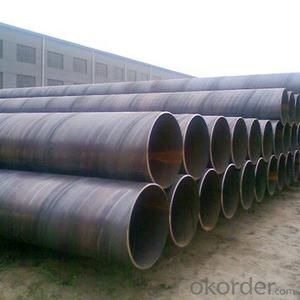
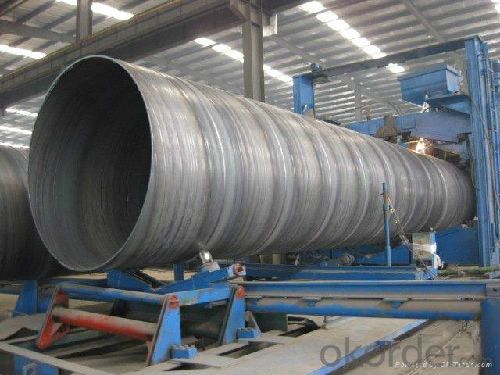
- Q: How are steel pipes used in the manufacturing of automobiles?
- Due to their strength, durability, and versatility, steel pipes find widespread use in the manufacturing of automobiles. Throughout the automobile manufacturing process, various applications make use of steel pipes. One primary application of steel pipes in automobiles lies in constructing the vehicle's chassis and body. Structural components, such as steel pipes, provide the necessary strength and rigidity. With the ability to be bent, shaped, and welded, steel pipes prove to be an ideal choice for automotive purposes. Additionally, steel pipes play a crucial role in the exhaust system of automobiles. Responsible for guiding and redirecting exhaust gases away from the engine, steel pipes form the exhaust manifold. They also contribute to the exhaust pipes and mufflers. Steel's high temperature and corrosion resistance make it suitable for enduring the harsh conditions of the exhaust system. Moreover, steel pipes serve in the cooling system of automobiles. They facilitate the transportation of coolant from the engine to the radiator and back, effectively regulating the engine's temperature. Due to their ability to handle high pressure and temperature, as well as their resistance to corrosion and chemical damage, steel pipes remain the preferred choice for this application. Furthermore, steel pipes find usage in the fuel system of automobiles. They ensure a consistent and reliable supply of fuel by transporting it from the tank to the engine. Steel pipes are selected for this purpose because of their resistance to corrosion and their ability to withstand the high pressure and temperature associated with fuel transportation. In conclusion, steel pipes are indispensable in automobile manufacturing. They contribute significantly to the construction of the chassis and body, the exhaust system, the cooling system, and the fuel system. Thanks to their strength, durability, and versatility, steel pipes are the preferred choice for various automotive applications.
- Q: What are the different types of steel pipe joints for underwater applications?
- Some different types of steel pipe joints for underwater applications include flanged joints, welded joints, and mechanical joints. Flanged joints involve connecting pipes by bolting together flanges at the ends. Welded joints are created by fusing the ends of pipes together using heat and pressure. Mechanical joints use couplings or connectors to join pipes together, typically with rubber seals to ensure a watertight connection.
- Q: What are the standard specifications for steel pipes?
- The standard specifications for steel pipes vary depending on the intended use and industry requirements. However, some common standard specifications include the pipe's size, wall thickness, material composition (such as carbon steel or stainless steel), and pressure ratings. Other specifications may include the pipe's shape, length, and surface finish. It is essential to consult relevant standards organizations, such as ASTM or ASME, to determine the specific standard specifications for steel pipes in a given application.
- Q: What is the difference between cast iron and steel pipes?
- Cast iron pipes and steel pipes are commonly used in plumbing and construction, but they have distinct differences. Let's explore these disparities. 1. Composition: Cast iron pipes consist mainly of an iron alloy, with small amounts of carbon and other elements. Conversely, steel pipes are primarily composed of iron, but they also contain varying amounts of carbon and other alloying elements like manganese, chromium, and nickel. 2. Strength: Steel pipes generally surpass cast iron pipes in strength due to their higher carbon content and alloying elements. This makes steel pipes more suitable for high-pressure applications or areas with heavy loads. 3. Flexibility: Compared to cast iron pipes, steel pipes offer more flexibility, making installation and adjustment easier. Cast iron pipes, being brittle, are less flexible and more prone to cracking or breaking under excessive stress or impact. 4. Corrosion resistance: Steel pipes are usually more prone to corrosion than cast iron pipes. However, this can be mitigated with various protective coatings or treatments applied to the steel pipes. Cast iron pipes, on the other hand, possess inherent corrosion resistance due to the formation of a protective layer of rust on their surface. 5. Noise insulation: Cast iron pipes excel in noise insulation due to their dense and heavy composition. This makes them ideal for reducing noise in residential plumbing systems. Steel pipes, being lighter and less dense, do not offer the same level of noise insulation. 6. Longevity: When properly maintained, cast iron pipes have a lifespan of over 100 years. Steel pipes, while still durable, may have a shorter lifespan depending on factors like the quality of the steel used, environmental conditions, and maintenance practices. In conclusion, the primary differences between cast iron and steel pipes lie in their composition, strength, flexibility, corrosion resistance, noise insulation, and longevity. The choice between the two depends on specific requirements, such as desired strength, durability, and noise reduction properties.
- Q: Which is better, galvanized steel pipe or stainless steel?
- Most of the use requirements are to maintain the original appearance of the building for a long time. In determining the type of stainless steel to be chosen, the main consideration is the aesthetic standards required, the corrosivity of the atmosphere in the area, and the cleaning system to be adopted. However, other applications increasingly seek only structural integrity or watertightness. For example, the roof and side walls of industrial buildings. In these applications, the construction cost of the owner may be more important than the aesthetic, the surface is not very clean can also. The use of 304 stainless steel in a dry indoor environment is quite effective.
- Q: How are steel pipes used in the manufacturing of agricultural machinery?
- Steel pipes are commonly used in the manufacturing of agricultural machinery for various purposes such as structural support, fluid transportation, and protection. They are utilized to create the framework and chassis of the machinery, providing strength and durability. Steel pipes are also used to transport fluids such as fuel, water, and chemicals throughout the machinery. Additionally, steel pipes can be used to protect vulnerable components from external elements, ensuring the longevity and reliability of the agricultural machinery.
- Q: How are steel pipes used in high-rise buildings?
- Steel pipes are used in high-rise buildings for various purposes, including structural support, plumbing, and HVAC systems. They provide the necessary strength and durability to withstand the weight and forces exerted on tall buildings, while also facilitating the efficient distribution of water, gas, and air throughout the entire structure.
- Q: How do steel pipes resist corrosion?
- Steel pipes resist corrosion through a process called passivation, where a protective layer of chromium oxide forms on the surface of the steel, preventing direct contact with corrosive elements and slowing down the oxidation process. Additionally, steel pipes can be coated with protective layers such as zinc or epoxy to provide an extra barrier against corrosion.
- Q: How are steel pipes used in the manufacturing of boilers?
- Steel pipes are used in the manufacturing of boilers as they provide high strength, durability, and resistance to extreme temperatures and pressure. These pipes are used for transporting hot gases and liquids within the boiler system, ensuring efficient heat transfer and preventing any leaks or failures.
- Q: How are steel pipes used in HVAC systems?
- Steel pipes are commonly used in HVAC systems for transporting hot or cold water, as well as other fluids like refrigerants and condensate. They are durable, resistant to corrosion, and can withstand high pressure, making them ideal for carrying fluids throughout the system. Steel pipes are typically used for water supply lines, steam distribution, and hydronic heating and cooling systems in HVAC installations.
Send your message to us
API 5L GR.B SSAW Steel Pipe With Good Quality
- Loading Port:
- Tianjin
- Payment Terms:
- TT or LC
- Min Order Qty:
- 25 m.t.
- Supply Capability:
- 10000 m.t./month
OKorder Service Pledge
OKorder Financial Service
Similar products
Hot products
Hot Searches
Related keywords
